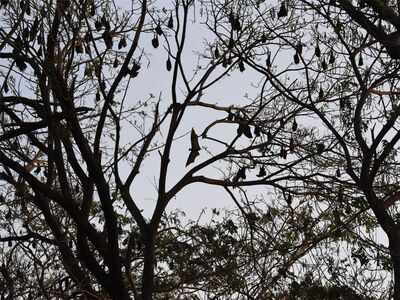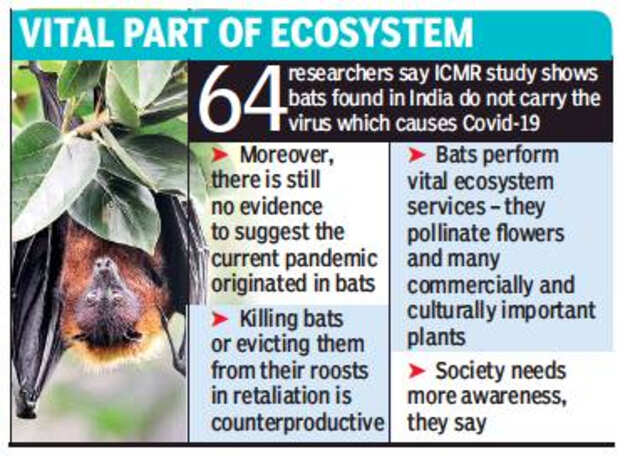
BENGALURU: A team of researchers based in various universities and conservation organisations in nine countries including India, Germany, UK, Australia and US, have urged people not to villainise bats which have been widely blamed – wrongly as the researchers point out – for the genesis of the current pandemic.
Several unverified social media posts have led to widespread antipathy and fear over bats among the general public in India resulting in a spike in the number of people demanding colonies of bats be removed from their neighbourhoods and destruction of bat roosts. The researchers say the viruses found in two species of bats found in India as per the most recent ICMR study, are different from the one that causes Covid-19 and therefore cannot spread the disease.

Researchers also argue that it is premature and unfair to blame bats or any other animal for the pandemic, given that the exact origin of the Covid-19 virus or its precursor is still not known.
“Information on current, and past zoonotic disease outbreaks suggest global wildlife trade and/or large-scale industrial livestock farming play an important role in such events. Killing bats and other wild animals, or evicting them from their roosts in retaliation is counterproductive and will not solve any problems,” a joint statement by 64 researchers reads.
They argue that bats, in fact, perform vital ecosystem services: They pollinate flowers of some mangroves, and many other commercially and culturally important plants. Insect-eating bats are voracious eaters of pests which target rice, corn, cotton and potentially tea plantation. Therefore, they say, bats benefit the ecology and human health, and provide intangible economic benefits.
Stating that none of the South Asian bats are proven to be natural reservoirs of the Covid-19 virus, they also point out scientists strongly suggest that it is highly unlikely for the viruses to jump directly from bats to humans. Also, there is no evidence of humans contracting coronavirus or any such viruses through excreta of bats.
Recently, an ICMR study found bat coronaviruses (BtCoV) in the common Indian flying fox and fulvous fruit bat. “However, less than 5% of the screened samples contained this BtCoV and, as the study mentions, it is very distantly-related to SARS-CoV-2 [which causes Covid-19] and hence cannot cause Covid-19,” they said.
“Society needs more awareness on bats around them in addition to epidemiological facts for a healthy coexistence. We urge governments of South Asian countries to strengthen the legal framework to protect bats in view of the services they render to the ecosystem and their slow breeding capacity,” the researchers further added.
Several unverified social media posts have led to widespread antipathy and fear over bats among the general public in India resulting in a spike in the number of people demanding colonies of bats be removed from their neighbourhoods and destruction of bat roosts. The researchers say the viruses found in two species of bats found in India as per the most recent ICMR study, are different from the one that causes Covid-19 and therefore cannot spread the disease.

Researchers also argue that it is premature and unfair to blame bats or any other animal for the pandemic, given that the exact origin of the Covid-19 virus or its precursor is still not known.
“Information on current, and past zoonotic disease outbreaks suggest global wildlife trade and/or large-scale industrial livestock farming play an important role in such events. Killing bats and other wild animals, or evicting them from their roosts in retaliation is counterproductive and will not solve any problems,” a joint statement by 64 researchers reads.
They argue that bats, in fact, perform vital ecosystem services: They pollinate flowers of some mangroves, and many other commercially and culturally important plants. Insect-eating bats are voracious eaters of pests which target rice, corn, cotton and potentially tea plantation. Therefore, they say, bats benefit the ecology and human health, and provide intangible economic benefits.
Stating that none of the South Asian bats are proven to be natural reservoirs of the Covid-19 virus, they also point out scientists strongly suggest that it is highly unlikely for the viruses to jump directly from bats to humans. Also, there is no evidence of humans contracting coronavirus or any such viruses through excreta of bats.
Recently, an ICMR study found bat coronaviruses (BtCoV) in the common Indian flying fox and fulvous fruit bat. “However, less than 5% of the screened samples contained this BtCoV and, as the study mentions, it is very distantly-related to SARS-CoV-2 [which causes Covid-19] and hence cannot cause Covid-19,” they said.
“Society needs more awareness on bats around them in addition to epidemiological facts for a healthy coexistence. We urge governments of South Asian countries to strengthen the legal framework to protect bats in view of the services they render to the ecosystem and their slow breeding capacity,” the researchers further added.

Coronavirus outbreak
Trending Topics
LATEST VIDEOS
City
 Delhi lockdown: People flout social distancing norms in Chandni Chowk ahead of Ramzan
Delhi lockdown: People flout social distancing norms in Chandni Chowk ahead of Ramzan  How a crocodile was rescued in Telangana
How a crocodile was rescued in Telangana  'Stay at home' message passed on by canine squad of bomb detection and disposal unit of Nagpur Police
'Stay at home' message passed on by canine squad of bomb detection and disposal unit of Nagpur Police  Covid-19 crisis: Empty wallets, stomachs and promises, workers in a fix in Chennai
Covid-19 crisis: Empty wallets, stomachs and promises, workers in a fix in Chennai
More from TOI
Navbharat Times
Featured Today in Travel
Get the app





